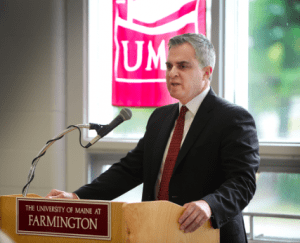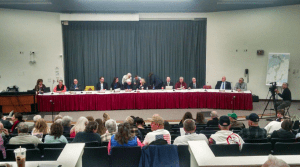
Nov 7, 2019 | Feature |
Zion Hodgkin Contributing Writer
Amidst the flashing strobe lights and roaring jams of the last two years, you could almost forget you were standing in a school cafeteria.
Every year, on the last Saturday before Halloween, UMF’s Association for Campus Entertainment (ACE) club transforms the Student Center into a spooky celebration. The Halloween dance has been one of the most anticipated annual events held at the school for the last few years. “A bunch of people show up,” said Madison Vigeant, one of the members of the ACE club putting the event together, “we usually have like 400 to 500 people every year.”
Sarah Szantyr, another member, chimed in saying, “And that includes students at the school, and also guests. I think we usually have about 100 to 150 guests each year.”
Inside the dance, it’s clear which of these students had been there before, as they immediately made their way to the front of the room, right before the stage, and started dancing, their costumes and accessories swinging around them.
“The dance has been going on for quite a long time,” Vigeant said, “at least five years, I would say, [but] probably ten.”
Szantyr nodded slightly. “It’s been going on since we’ve been here. This will be our third year putting it on.”
A student walked up to the table by the entrance to the dance, where Vigeant sat, and investigated the baskets brimming with items at the end of the table. “They’re the prizes for the costume contest,” Vigeant said with a kind smile. “We have a few different categories that you can enter for.” She leaned down, as if re-checking the contents of the baskets and continued, “We have scariest costume, a free one [where you can enter with any costume], funniest, couple, another couple, and most creative.”

Alexis Ramee sporting her makeup, which won scariest costume. (Photo courtesy of Alexis Ramee)
Nodding excitedly, the student grabbed an entry form and began to fill it out.
“The costume contest has been happening for awhile too,” said Vigeant. “Last year was the first year we did it where I was involved. But if I were going to guess, the costume contest started a few years after the dance did. Maybe once the dance did well for a couple years.”
The costume contest has since become an iconic part of the Halloween dance, with most students signing up as they enter the event, and the night ending with the announcement winners. “We close the contest at midnight, and they stop the music for the announcement at 12:15 to 12:30,” Vigeant says, “and if the winner isn’t here, they’ll get an email, and can come pick up their prizes next week.”
Winner of scariest costume, junior visual arts major Alexis Ramee, left the dance before the winners were announced and woke up a week later to an email indicating that she won. “It made me really happy,” she said. “It made my morning.”
With a talent for special effects makeup and a preferred horror aesthetic, Ramee used liquid latex and polymorph plastic to create the illusion that her face had been split down a central seam and opening around her mouth. The look was meant to symbolize the importance of speaking a truth, even if it means tearing your mouth open to speak. “Generally I had pretty good reactions [to my costume], there were a couple of people that were slightly scared but I never, like, terrified anyone,” she said.
Even the campus police officers monitoring the entrance were taken aback by Ramee’s makeup. “Oh, they loved it,” Ramee said. “Even Brian Ufford was like, ‘Good makeup!’” While she said that she hadn’t seen anyone with makeup to compete with hers, she enjoyed the comedy of seeing two students dressed as bananas accompanying another dressed as a gorilla, as well as two Waldo’s. “It was just a really fun night to get away from all the school work.”

Darby Murnane in Medusa paint. (Photo courtesy of Darby Murnane)
As a dance full of partying college students naturally earns a reputation for crazy sights and stories, Szantyr and Vigeant reflect on what they’ve witnessed in years passed. “We don’t have any personal funny stories from the dances we’ve been around for,” Szantyr said, “but we were told on our first year of putting on the dance, that there would be a lot of people that were not fully aware of our surroundings,” she smiles a bit slyly and turns to look at Vigeant before continuing, “if you know what I mean.”
Vigeant shot back a smirk in response, as though she knew exactly what Szantyr meant, then added “Oh, also, one year an ACE member saw a girl beat up a pumpkin right outside of the dance.”

Sep 26, 2019 | Feature |
Darby Murnane, Editor in Chief

Serna aims to add diversity to the UMF community and to build strong relationships with students (Photo courtesy of UMF).
New UMF President Edward Serna envisions a future of the university which fosters opportunity for greater student diversity, career development and increased community partnerships. Serna also aims to continue work started last spring in response to Bangor Daily News articles on UMF’s handling of sexual misconduct via Title IX investigations.
Serna said he is “curious to start developing a new marketing plan and to start investing in that area,” as a way of bolstering the diversity of UMF’s student population and outreach to prospective students. Part of this marketing campaign has entailed Serna traveling to Maine high schools and community colleges where he’s spoken with principles and administrative staff.
Coming from University of Arkansas- Fort Smith (UAFS), where Serna previously worked as the interim chancellor, he said, “We had a large Hispanic population, a large Vietanmese population, representing our campus population. So I think coming to Maine, which in my understanding is the oldest and whitest state in the union, there’s some challenges there. How do you create a diverse student body when your state doesn’t represent that?”
In his conversations with community colleges, Serna indicated that there are plans to arrange partnerships between these schools and UMF as part of student outreach. “[There’s] excitement around the community colleges to even partner with us,” he said.
Serna said that it is currently unclear exactly what those partnerships would entail but there will soon be follow-up meetings to discuss possibilities.
His vision for UMF’s community involvement exists hand-in-hand with his goals for more in-depth career development. “I think our mission has to be more about career development, not necessarily that first gateway job but about putting our students in a position to have a fulfilling life and a fulfilling career,” Serna said. He’s thinking of partnering with nonprofit organizations in the area, preferably ones that students might seek employment with post-graduation, and has spoken with the Board of Visitors on this topic.
“The partnerships have to make sense for that school,” he said, “. . . .[UAFS] is very much a workforce development school. . . .This was about social mobility for these kids and a better life. So I felt it was incumbent upon me to be their advocate so they would have those opportunities.”
Serna is strategizing, with help from the new Vice President of Student Affairs Christine Wilson, to address the lingering tensions from Title IX issues of last semester. According to Serna, his and Wilson’s conversations have focused on their goal to build a specific culture on campus: “. . .a culture of healthy relationships, a culture where people feel safe from harassment or discrimination, that’s our vision.”
Wilson and Serna are attempting to follow through on the proposals brought forth by students to address these issues. “. . .there were recommendations [for a student advocate position] made by [Look Us In The Eyes],” Serna said. “Christine is now working with those recommendations to get them implemented.”
“Personally, from my office, I want to continue to make sure that Students are heard,” Serna continued, “I want to make sure there are mechanisms in place that we hear you, and that we’re listening.”
He is also planning a President’s Advisory Council student representatives to establish more direct contact and transparency between the student body and his office. Serna ideally would like to hold monthly meetings with students, staff and faculty senates individually. “I want [the student’s] voice at the table. And it’s such a valuable perspective that I don’t know how we would operate without it,” he said.
Serna issues a call to UMF students to “keep having honest conversations with me, stop me when I walk into work in the morning.”
The sense of community at UMF and in Farmington as a whole has deeply moved Serna and drives his goals for the university. “Even with the tragedy that happened recently, I think the thing that really just took Lauren, my wife, and I back was just the outpouring of support from the community and the campus,” he said.
Following last week’s explosion of the LEAP building on Sept. 16, Serna attended the candle vigil in honor of the fallen fireman, Captain Michael Bell. “I was so proud and so encouraged by the number of UMF students there. . . I think sometimes the narrative about your generation, if you will, is that you’re disconnected, you’re not part of the community. It really moved me seeing how many of us were there supporting the community on a school night if you will. My daughter was there and it was so important for her to see.”

Apr 19, 2019 | Feature |
By Darby Murnane & Emily Mokler Assistant Editor & Editor-in-Chief

The public forums provided a platform for discussion about the CMP powerline. (Photo by Emily Mokler)
Maine’s Department of Environmental Protection (DEP) hosted a week-long collection of hearings and two public forums on the UMF campus to address the proposed Central Maine Power (CMP) transmission line during the first week of April. This project, the New England Clean Energy Connect (NECEC), has been met with controversy from Maine residents as both those for and against the project have voiced concern over how the state’s actions will impact the course of climate change.
The transmission, according to The Portland Press Herald, will run 145 miles from the Canadian border just north of route 27 to Lewiston, ME, and approximately 50-55 miles of this would be newly constructed lines, the remaining distance consisting of existing lines that would be widened by 75-150 feet. Electricity generated by Quebec Hydropower would be carried to Massachusetts via the NECEC to aid MA. in meeting state green-energy standards. The transmission line is set to run directly through Farmington.
Many Mainers came forward during the public forums on April 2 and 4 to argue in favor of the line and implored the DEP panel members to take timely and productive steps to reduce greenhouse gas emissions. Speakers often cited the estimated 12 years the world has to take proactive steps in reversing climate change before it is too late.
The project is also meant to provide economic benefits to Mainers as workers will be needed for construction. Matt Marks, CEO of Associated General Contractors of Maine (ACG) spoke at the April 6 forum on behalf of his company to argue for the NECEC job opportunities, stating that AGC had lost 10,000 workers in recent recessions. “More than 5200 megawatts of oil, coal, and nuclear power plants will be retired from from 2013-2022. And another 5000 megawatts of coal and oil fire generation could retire in a couple years,” Marks said. “We need to replace these plants and 1200 megawatts of clean, reliable hydropower delivered to Lewiston, maine will be the region’s largest source of electricity from clean energy.”
Conversely, those speaking against the NECEC expressed fear that environmental damage and greenhouse gas emitted by the construction of the line will outweigh the proposed benefits. As an estimated 50-55 miles of land would be cleared to make way for the transmission line, environmentalist opponents argue that the deforestation and carbon dioxide (CO2) released from clear-cut vegetation essentially cancels out what CO2 is meant to be eliminated by the NECEC.
Tom Saviello, a former Maine Senator, also spoke at the April 6 forum, adding to the environmental debate with his expertise in forestry, having earned a Phd in Forest Resources from University of Maine. “One tree can absorb as much carbon a year that a car produces while driving 26,000 miles. Over the course of a life, a single tree can absorb one ton of carbon dioxide,” Saviello said. “So if we take the 55 miles of the corridor, that’s 150 feet wide and the rest 70 feet wide, we’ll cut a lot of trees which will equate to about 800,000 pounds of car carbon emissions.”
There was some discrepancy among speakers about how many trees would actually be cut as many in favor of the line argued that the supposedly pristine wilderness through which the line would run is already crossed by access roads, as well as stretches of working forests such as logging ground. Yet those against the line noted that logged forests are able to regrow, whereas land home to transmissions line are routinely sprayed with herbicides to keep vegetation at bay.
As Saviello testified before the DEP panel, he also commented on Maine’s legal responsibility in addressing climate via environmental law, stating, “We set goals for Maine, not New England. So I do suggest this part of the law should be addressed as part of the site location permit for [NECEC] can be issued.”
Apr 5, 2019 | News |
By Darby Murnane Assistant Editor
UMF administration, though proactive in response to discussions of sexual misconduct, is still under scrutiny from the UMF community as they continue fighting for changes that will better the pursuit of justice in allegations of Title IX violations. Look Us In the Eyes (LUITE), a student coalition, has continually met with the President’s Council to promote transparency between administration and students.
LUITE is not seeking an overhaul of UMS policies, but for better enforcement of current ones. “I think UMF got lazy,” said Amy Fortier-Brown, leader of LUITE, in an email interview. “We have a Student Code of Conduct and federal laws that protect students on UMF’s campus when they are assaulted. The school just hasn’t done their job in the past of enforcing them.”
Dr. Kelly Bentley, Associate Professor of Community Health and key faculty member in the composition of Dr. Karol Maybury’s Open Letter to Students, calls for more enduring actions from administration. “Campus sexual violence is also about culture,” Bentley said. “So something that is missing at this stage is a really big, overall strategic plan to address healthy relationships. Unless we create an overall culture [of respect on campus], and that’s… a long-term thing, research has shown we won’t have significant success.” Her research finds that scattered events like panels and documentary screenings are ineffective in creating the necessary change in culture.
As Bentley’s area of expertise is gender-based violence with scholarship in domestic and intimate partner violence, she feels the conversation misses key elements. “I’m shocked that there seems to be such an extreme focus on sexual assault without discussing relationship violence, because for the most part sexual assault is perpetrated by someone you know. When we don’t talk about healthy relationships and relationship violence, there’s a disservice and we’re missing things.”
Her claims are supported by a 2018 report from the Maine Domestic Abuse Homicide Review Panel, which found that of Maine’s total homicides, 43% were domestic. The Maine Coalition to End Domestic Violence webpage also cites that one in four women and one in seven men have “experienced severe physical violence by an intimate partner in their lifetime.”
Bentley also expressed concern for the lack of LGBTQ+ perspectives; she says the majority of student feedback has been from those identifying as heterosexual. “We are looking at violence from a white, hetero-normative sexual assault perspective. We don’t include relationship violence; we haven’t opened [the conversation] up to include thoughts from other groups that should be a part of it.”
Faculty and LUITE are advocating for a health and wellness class for first-year students that emphasizes healthy relationships and sexual consent as part of evidence-based prevention programming. This would bring awareness about Title IX rights to students.
“I think the most important thing is for students to really understand Title IX and all its intricacies because it’s not as easy as just reporting,” Bentley said.
LUITE has pushed administration and Title IX coordinators to make a flow-chart outlining reporting options and processes, but no such document has been released. “My understanding is that the flow chart is stuck in bureaucratic limbo,” said Fortier-Brown. “I don’t expect to see it this semester, if at all.”
Bentley hopes for more proactive staff positions at UMF to prevent such standstills. “There’s a difference between someone who coordinates Title IX and just says, ‘I’ll take your report and I’ll follow through,’ and someone that coordinates health and wellness on campus,” she said.
Fortier-Brown recently outlined such a position, proposing that the administration employ a student advocate. “It was received well. My hope is that it will actually become something and replace CVPC,” she said.
Interim President Dr. Eric Brown said in an email interview that he plans to use part of the $3.3 million anonymous gift to hire a fourth mental health counselor and establish current counselor Sarah Carnahan as leader of an “advisory/advocacy group on Title IX and campus violence . . . This group will consolidate the diverse interests working now on these issues and be the spearhead for future programming and for making sure the momentum we currently have is not dissipated.”
Brown has also continued the process of amending section VII. A. of the Student Code of Conduct so it will be standard practice for a review panel to hear final Title IX appeals as opposed to one person. “I expect it will be formally adopted by mid-April,” he said.
Fortier-Brown and Bentley are optimistic about the direction in which UMF is heading, believing that the administration is more receptive now than it has been.
Mar 1, 2019 | Feature |
By Darby Murnane Assistant Editor
The administration is seeking to amend policies within the Student Code of Conduct on the investigation of sexual misconduct, as part of the ongoing collaboration with students, faculty and campus organizations.
The Administration Campus is working with organizations such as Look Us In The Eyes (LUITE) and the Campus Violence Prevention Coalition (CVPC) to foster a conversation about sexual assault in the community. An “Open letter to the Students of UMF,” written by Dr. Karol Maybury in cooperation with the Diversity and Inclusion Action Team, also called for a greater effort to provide education on sexual consent, health, and wellness, Title IX training and more readily accessible information on these matters.
The Code of Conduct, which applies to the University of Maine System as a whole, was revised in July 2018, but there is a push from the community to amend it further- specifically, a revision of how final appeals are heard during investigations of misconduct.
Interim President Dr. Eric Brown has proposed an amendment to section VII. A. of the Code which would prevent the president from making the final decision on a final appeal during investigations. “The addendum we would make in house would direct a president of our university, as standard practice, to choose a review panel rather than a single individual to hear a final appeal,” Dr. Brown says.
As the Code currently stands, the president has the authority to choose -or have a designee choose – a single faculty or staff member to review a case as part of a final appeal. They president can also choose a review panel of three.
The purpose of such a change is to bring more perspectives with which to review case information and keep the power of decision-making dispersed. “It protects both sides [in an investigation] because you don’t want to be a single person making that decision, I think if you can help it,” Brown said, “but I think that it’s tricky with a smaller campus because we have a smaller pool to draw from of trained individuals to serve on those appeals boards.”
To combat conflicts of interest that arise from a small population like that of UMF, Brown hopes to expand the pool of individuals from which investigating committees and panels are chosen to a system-wide search.
The Code provides flexibility for individual campuses to make such changes, as Section V. states: “Each University campus may adopt procedures for carrying out the provisions of the Code within the guideline set forth by the Code as described below and consistent with the Code.”
“So that suggests that there is some leeway for each campus to make some procedural choices for themselves as long as it doesn’t contradict the guidelines of the code,” Brown said.
As these changes are made, it is important to remember that the UMaine system only has authority in restructuring administrative policy, not the Title IX procedures as that is federal law. “There is a misperception that UMF wrote the policy and we did not,” Chief Brock Caton of Campus Police said in an email interview. “So a systematic change needs to be done and we are doing our part to improve/effect that change.”
Within his own department, Chief Caton has increased training requisites for his officers and opened up a Police Sergeant’s position. “I have required my officers to complete the UMS Academy Mandatory Training which covers, basic safety, information security, Sexual Harassment, FERPA and Title IX training,” said Caton via email.
Looking to the future, Brown intends to keep the community conversation on sexual misconduct going strong. “One immediate concern I have after talking with the student leaders of the campus of CVPC, LUITE, is that I want to make sure that all the good being done by those groups and others continues past this semester,” Brown said. “You don’t want to return to a comfortable status quo, and particularly with an issue like this, there’s going to be a lot of pull for that to happen.” He intends to keep up what he calls, “a productive level of disruption.”



